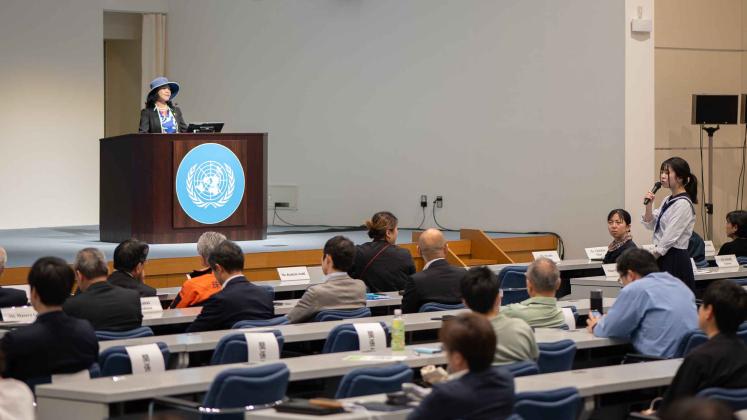On 11 May 2024, UNU-IAS co-organized a symposium on supporting recovery efforts on Noto Peninsula, Ishikawa, Japan, following the 2024 Noto Peninsula Earthquake. Held at UNU headquarters in Tokyo, the event shared diverse perspectives and action plans for recovery, emphasizing the need for enhanced cooperation between local and international communities.
Tshilidzi Marwala (Rector, UNU), Kentaro Asahi (Parliamentary Vice-Minister of the Environment, Japan) and Atsuko Nishigaki (Vice Governor, Ishikawa Prefecture) delivered opening remarks. Masuhiro Izumiya (Mayor, Suzu City) and Jin Sato (Mayor, Minamisanriku Town) discussed the current situation, remaining challenges and ongoing reconstruction efforts. Mr. Izumiya shared his vision for recovery, including the utilization of Noto's satoyama and satoumi resources, and future community development incorporating the SDGs. Mr. Sato introduced his initiative for the sustainable restoration of the forestry and fishery industries following the 2011 Great East Japan Earthquake.
Reconstruction efforts by the Government of Japan were introduced by representatives of the Ministry of the Environment, the Ministry of Agriculture, Forestry and Fisheries, and the Ministry of Education, Culture, Sports, Science and Technology. In a video message, David Cooper (Acting Executive Secretary, Secretariat of the Convention on Biological Diversity) noted that a resilient and sustainable recovery in Noto would also contribute to solving issues faced by the international community.
A panel discussion moderated by Kazuhiko Takeuchi (President, IGES) highlighted the importance of collaboration across generations, sectors and regions as essential to recovery. Panelists concluded that a long-term reconstruction plan must be developed in cooperation with young people who will spearhead the future of the Noto region. In closing, Tsunao Watanabe (Director, UNU-IAS OUIK) gave a summary of the symposium, and Shinobu Yume Yamaguchi (Director, UNU-IAS) emphasized that the reconstruction efforts will not only help to rebuild the affected areas, but also contribute to the revitalization of the Noto region.
The event was co-organized by UNU-IAS, the Ministry of the Environment, Japan (MOEJ), Ishikawa Prefecture, the Institute for Global Environmental Strategies (IGES), the Global Environment Outreach Centre (GEOC) and the Japan Foundation for the United Nations University (JFUNU). It was supported by the Keidanren Committee on Nature Conservation, the Japan Global Biodiversity Framework, the AEON Environmental Foundation and the Environment Research and Technology Development Fund S21, with cooperation from Springer Nature.



